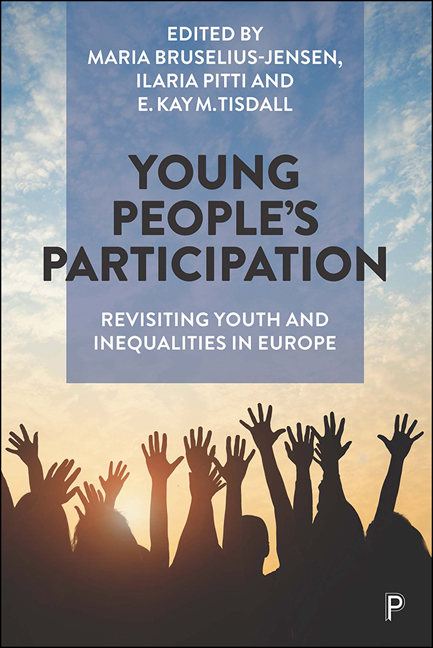Book contents
- Frontmatter
- Contents
- List of figures and tables
- Notes on contributors
- Acknowledgements
- 1 Revisiting young people's participation: an introduction
- PART I Young people's experiences of participation and engagement
- PART II Current state and conditions for young people’s participation: critiques and trends
- PART III Broadening participation: young people's own approaches to participation
- PART IV New opportunities for young people's participation: facilitating new forms of youth participation
- Index
6 - From ideology to strategic engagement
Published online by Cambridge University Press: 18 December 2021
- Frontmatter
- Contents
- List of figures and tables
- Notes on contributors
- Acknowledgements
- 1 Revisiting young people's participation: an introduction
- PART I Young people's experiences of participation and engagement
- PART II Current state and conditions for young people’s participation: critiques and trends
- PART III Broadening participation: young people's own approaches to participation
- PART IV New opportunities for young people's participation: facilitating new forms of youth participation
- Index
Summary
Based on a secondary analysis of the International Civic and Citizenship Education Study (ICCS) – a comparative, quantitative study involving grade 8 students in 24 countries – and a qualitative study of more than 50 Danish grade 9 students, this chapter explores young people's attitudes toward political engagement and participation. The chapter aims to study drivers for and barriers to civic engagement, but also to challenge conventional understandings of political participation. Many studies have shown that inequality has a significant impact on young people's political participation. However, this chapter argues that young people's engagement is a consequence of current discourses of post-politics rather than conventional ideological conflicts, distribution of material goods and values, and societal inequalities. The thesis in this chapter is that young people's engagement in society is changing from ideological engagement to strategic engagement.
Key findings
• Young people's engagement in democracy is increasing.
• Young people have a conventional rather than an unconventional attitude to society.
• Young people's political engagement is changing from ideological to strategic engagement.
• The future generation is beyond left-wing and right-wing ideologies.
• Today we see new forms of inequality with respect to political participation.
Introduction
This chapter explores and discusses young people's attitudes toward political engagement and participation. It studies new and changing forms of political engagement and aims to challenge what can be defined as conventional understandings of youth, inequality and political participation.
The ICCS reveals that, in terms of knowledge, interest and engagement, the level of young people's engagement in society is increasing, but it also shows that the form of their commitment is changing (Schulz et al, 2018a). These findings are particularly significant in Denmark (Bruun et al, 2018; Schulz et al, 2018a) and, therefore, this chapter focuses on Danish youth and aspects of their political education. In this context, Danish students and the Danish educational system are not unique but exemplary. By investigating Danish students, it becomes possible to examine new and particular features of young people's political engagement more generally. The ICCS shows that significant tendencies among Danish young people are indicative of a general and prevailing trend occurring across Europe.
- Type
- Chapter
- Information
- Young People’s ParticipationRevisiting Youth and Inequalities in Europe, pp. 77 - 98Publisher: Bristol University PressPrint publication year: 2021



